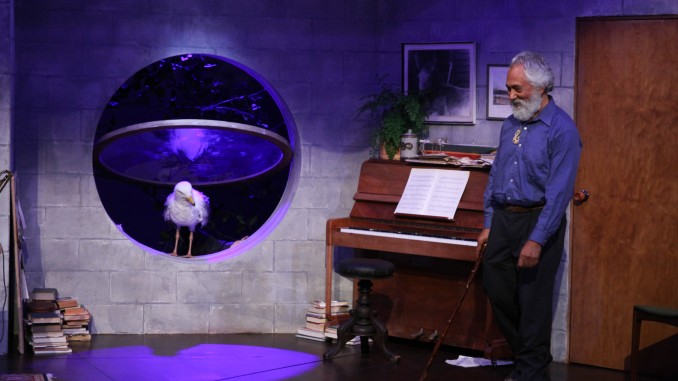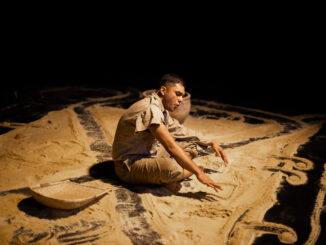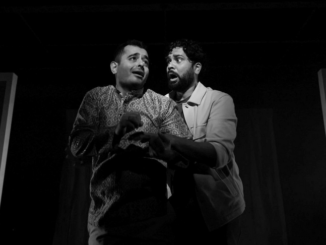
[Being and Nothingness]
There’s something exciting about a play that starts off behind a curtain. Not only is it delightfully old-fashioned, but it also fills the audience with anticipation of what’s to come. Expectations are raised and you can bet we’re expecting to be wowed. So when the curtain is finally pulled back and we see Bruce Mason’s study, I’m not quite blown away, but I am incredibly impressed. And that seems to reflect how I feel about the show as a whole, a play that doesn’t quite connect with me on a personal level, doesn’t quite move me, but is inarguably made with impeccable craftsmanship.
Described as a play about grief by writer Carl Bland, Te Pō starts off as a comedic detective story, as three characters wait and search for our very own late, great playwright Bruce Mason and then evolves into an existential search for their own identities. And like any good absurdist play, little actually happens over the course of the show. Instead of plot and drama we experience ideas. Ideas about loss, identity, childhood and growing older. But it is, first and foremost, a comedy. The repetitions of action, the cartoonish interactions between the characters and the amusing wordplay make up the bulk of the show. There’s a quaint quality to the laughs rather than any trace of black comedy contemporary audiences have come to expect nowadays. Even the odd moments of violence are purely slapstick. So while the form of the play is sneakily subversive, the jokes feel old-fashioned and reserved. It’s here that personal taste comes into the matter and I find it difficult to engage with the humour. Luckily the play is punctuated with great insight, both poetic and philosophical that more than makes up for it.
Those acquainted with Bruce Mason will get the most out of Te Pō, though it requires only a passing knowledge of his central plays or at least an understanding of who he was to enjoy it. His three best known works The Pohutakawa Tree, Awatea and The End of the Golden Weather are all paid homage to beautifully. The play is littered with clues and symbols as to what is going on well before the reveal—which is only a spoiler for the completely uninitiated. That is, that the three main characters are, indeed, merely characters from Mason’s plays.
So while it’s fitting that the characters seem stuck in their own characterisations, unable to define who they are outside of their given circumstances, it also make them difficult to empathise with. All they can do is wait, stuck in their own bubbles, only able to truly express themselves through brief monologues. It’s not until they finally fit the pieces of the puzzle together that the play’s structure is ruptured and their bubbles are popped. And this is when they come alive.
As Werihe, George Henare brings a powerful dignity to the role. His character struggles the least with his identity, and has less of a journey or arc compared to the others. But he feels nonetheless necessary, grounding the show with a spiritual weight that avoids feeling tokenistic. Andrew Grainger is also perfectly cast as Detective Inspector Brett, a man so serious he becomes the butt of his own jokes. While this is the sort of role Grainger could play with his hands tied around his back, it doesn’t make him any less watchable. His eventual existential crisis is also suffused with a genuine sense of tragicomedy, both amusing and sad to witness. But it’s writer Carl Bland who also plays Revered Sedgwick, the man of God with a crisis of faith, that strikes me as the most significant. That his character is struggling to deal with the death of his wife, which parallels Bland’s own life, is no coincidence, and acquires deeper meaning and pathos because of it. And for all the magical moments of the show, it is his final sermon that will stick with me in its emotional nakedness. Bland delivers it with an unrestrained rage, achieving a King Lear-like fury that cuts straight to the heart.
Director Ben Crowder has done a remarkable job with the script, bringing all its beautiful contradictions together, particularly the tension of realism versus artifice. Everything in the production comes together perfectly. Andrew Foster’s set has a great lived-in quality to it, every detail filled with a sense of warmth and comfort, designed to evoke the realism of the well-made play. The little touches from the stacks of books on the floor to the sheet music sprawled on top of the piano are what really bring it to life, establishing the conventional architecture of the play, while allowing for it to be subsequently blown apart. The same goes for John Gibson’s sound design which helps transform and relocate the entire setting later on. The lighting by Nik Janiurek is simplistic, but subtly drawing attention to its own artificiality when appropriate. The costumes by Elizabeth Whiting also capture the personalities of the characters before they even open their mouths, right down to the idiosyncratic details. And the animal puppets designed by Main Reactor and operated by Ella Becroft are simply astonishing and contribute to the playfully surreal tone to the show.
Te Pō is a play that begs to be unpacked, every object and line loaded with meaning. It’s not difficult to imagine scholars picking at the multitude of references and analysing them obsessively down the line. Sometimes this results in a show that feels overstuffed with ideas, more clever than affecting. But if it doesn’t always engage your heart then, then, at the very least, you can be sure it will engage your head. This is imaginative and ambitious theatre, unafraid to ask the big questions, probing the nature of existence and grief. Reminding us that life can be funny and sad, meaningless and significant, universal and personal, all at the same time.
Te Pō is presented by Theatre Stampede and Nightsong Productions and plays at Q until 14 March. Details see Auckland Arts Festival
SEE ALSO: Theatreview.org.nz review by Heidi North-Bailey
AND Critical Essay by James Wenley for the Pantograph Punch: Three Characters in Search of an Author: Te Pō and the Legacy of Bruce Mason




Leave a Reply